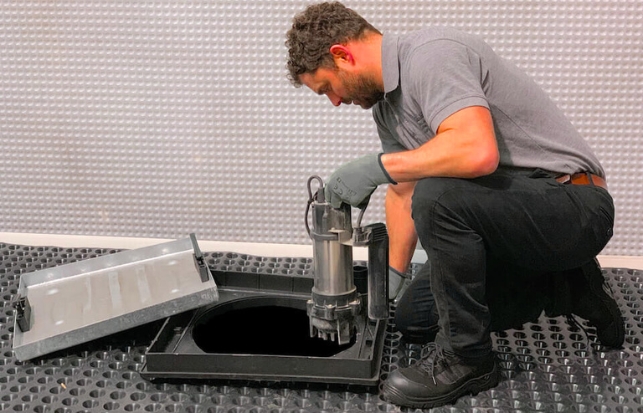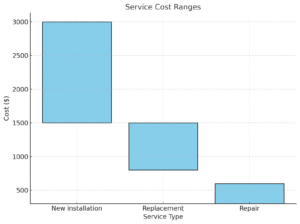
Flooded basements, damp crawl spaces, and water damage repairs are some of the most expensive problems a homeowner or business property owner can face. One of the smartest ways to prevent these issues is by installing a sump pump. Yet, when people begin researching installation, one big question always comes up: How much does it cost to install a sump pump?
The answer is not one-size-fits-all. Costs vary depending on the type of pump, the complexity of installation, labor rates, and even local conditions. For homeowners, the investment protects the property’s foundation, belongings, and health. For businesses in construction, real estate, or property management, understanding installation costs helps when budgeting for projects, negotiating contracts, or planning long-term maintenance.
This blog will cover every aspect you need to know. We will talk about what a sump pump is and how it will work, why it is important to know about its cost, and also about every factor that influences the final payment. It will also cover a clear breakdown of costs along with the charts, and will share the practical values and insights to help you make the right decision
What is a Sump Pump?
A sump pump is basically a water removal device that is installed beneath the basement or a crawl space. The job is to collect excess water from your property and pump it away. The place where the pump sits is a specially designed dug pit named a sump basin, where the water from the ground and the rain flows naturally. The best feature of this pump is that it activates automatically and directs the water outside as soon as the water in the pit reaches a certain level
For businesses, sump pumps are not only about preventing water damage but also about protecting infrastructure investments, ensuring tenant satisfaction, and maintaining property values.
Why Knowing Cost is Important
For consumers, understanding the cost ahead of time allows them to budget effectively and avoid surprises. It also helps you compare quotes fairly and decide between new installation, replacement, or repair.
For businesses, knowing cost structures means being able to accurately forecast expenses in development projects, plan long-term maintenance budgets, and even negotiate better rates with contractors.
When you think about the potential damage water can cause, mold growth, ruined flooring, and structural decay, the upfront investment in a sump pump is small compared to the cost of restoration.
Quick Cost Summary at a Glance
The national average cost to install a sump pump generally falls between $1,200 and $2,500. However, the range can go as low as $600 for simple repairs and as high as $5,000 for complex installations.
Here’s an at-a-glance breakdown:

Businesses that install multiple pumps in large residential or commercial properties can negotiate better per-unit pricing, but labor and material costs still drive totals higher.
Cost Breakdown Summary
The cost of installing a sump pump is rarely a flat figure. Several components contribute to the final bill.
As shown above, labor often takes the largest share, followed by the pump unit itself. Materials like piping, gravel, or backup batteries add to the bill, along with permits and inspections in regulated areas.
Sump Pump Installation Cost Based on Sump Pump Types
Not all sump pumps are equal. Submersible pumps are more expensive but handle higher volumes of water. Pedestal pumps are cheaper upfront but may not last as long in high-demand situations. Battery backup systems or water-activated models increase reliability but raise costs. Here are the types of sump pumps in detail.
Submersible Sump Pump
This type sits fully underwater in the sump pit, so it’s quiet and powerful. It’s sealed to prevent electrical risks and can quickly move large amounts of water—perfect for flood-prone basements. They last 10–15 years with good care, but they do need professional installation. Expect to pay $150–$400 for the pump and $800–$1,500 for installation.
Pedestal Sump Pump
With the motor sitting above the pit, pedestal pumps are easy to access, repair, and maintain. They’re cheaper than submersibles but a bit noisier and less efficient for heavy flooding. On the plus side, they can last 20–30 years. Costs run about $100–$300 for the unit and $600–$1,200 for installation.
Battery Backup Sump Pump
A lifesaver during power outages. This backup kicks in when the main pump can’t run, keeping your basement dry. It works alongside your primary pump and gives peace of mind in storm-prone areas. Prices are around $300–$600, with installation between $700–$1,200.
Water-Powered Sump Pump
Runs on municipal water pressure instead of electricity or batteries, so it works as long as your water supply does. Great as a backup, though less efficient and not an option for homes with well water. Costs fall between $200–$500, with installation around $700–$1,400.
Combination Sump Pump System
The best of both worlds—an electric pump with a built-in battery backup. The main pump handles everyday work, while the backup takes over if power goes out. Ideal for flood-prone homes, though it’s the priciest choice. Expect $500–$1,000 for the unit and $1,200–$2,500 for installation.
Factors Affecting Installation Cost
1. Installation Complexity
The complexity of installation depends on the home or building design. If a sump basin needs to be dug into a concrete floor, costs rise due to extra labor. Installing in a finished basement costs more because flooring must be removed and restored afterward.
2. Labor Rates
The plumbing labor rates differ widely across different regions. In some cities, professional plumbers usually charge from $70-$100 per hour; however, in smaller cities or towns, the rates are closer to $50.
3. Geographic Factors
There must be some areas that have higher water tables, frequent rainfalls; these areas incur a greater charge because of their complex site conditions. Permits may also be required in urban areas, adding another line to the budget.
Repair vs Replacement vs New Installation
To help clarify how costs compare, here is a simple chart showing the average prices of each service type.
Repair | Replacement | New installation |
This is the least expensive, usually under $600, but only effective if the pump itself is still in good condition. | It is mid-range, covering both a new unit and moderate labor. | It is the most expensive since it involves digging, basin preparation, and full setup. |
For homeowners, repair may solve small issues, but businesses often choose replacement to ensure reliability across multiple properties.
Hidden and Additional Costs to Watch Out For
Many people only budget for the pump unit and labor, but forget about extra costs. These include:
- Battery backup systems, essential for power outages.
- Check valves to prevent water from flowing back into the pit.
- Permit fees in regulated municipalities.
- Discharge line extensions if water must be directed far from the foundation.
- Annual maintenance or service contracts
Tips to Save Money
- Get multiple quotes from licensed plumbers.
- Consider grouping sump pump services with other plumbing work.
- For businesses, negotiate long-term service contracts.
- Install during off-peak seasons when contractors are less busy.
- Ask about warranties to reduce long-term repair costs.
Why Choose Best Choice Plumber to Install a Sump Pump
Best Choice Plumber has become a trusted name for sump pump services because we offer fair pricing, trust, credibility, and a high level of professional services in both residential and commercial projects. We are being appreciated by homeowners for our personal attention to detail, while the businesses value our ability and efficiency to deal with larger contracts professionally and efficiently. Our team obeys and understands local regulations and makes sure that the installations meet the inspection standards.
With 24/7 availability, transparent pricing, and proven results, Best Choice Plumber is the partner both households and businesses can count on to keep properties dry and protected.
Conclusion
Installing a sump pump may not be the most glamorous home improvement, but it is one of the most essential. From protecting your basement against flooding to preserving the value of large property investments, the cost is justified by the protection it provides.
If you are a homeowner looking to safeguard your basement, or a business needing reliable installation and maintenance across multiple properties, Best Choice Plumber is here to help. Contact us today for a detailed quote as per to your needs and keep your property safe from water damage.
Frequently Asked Questions
Pump type, installation complexity, labor rates, and local permit requirements all influence the final price.
Licensed plumbers or waterproofing contractors typically handle installations.
Repairs usually range from $300 to $600, depending on parts and labor.
Yes. A backup keeps the pump running during power outages and can prevent major flooding.
